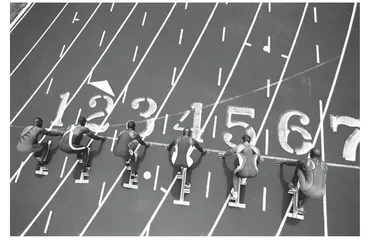Compete with Yourself 与自己竞争

There is a famous saying in sports games: “Second place is just the first loser.” Humans are born to compete with one another. Although the competitive spirit may be as natural as breathing air, it does not always lead to human developing strongly. On the contrary, left unmanaged, it can create great unhappiness for ourselves and others.
Avoiding competition can be a way of preventing unhappiness. But there is another method to solve this problem and we don’t need to dispense with our competitive nature completely: Instead of always going for gold, shoot for the bronze.
Although second place may be the first loser, third place can be the real winner—at least when it comes to happiness and longevity. This conclusion comes from research carried out on Olympic athletes. In a study, researchers discovered that the bronze winners appeared happier on average than the silver medalists after their events.
Another study looked at the average longevity of all three medalist groups. It found that the athletes whose best performance was silver lived to 72. Gold medalists beat this by a full four years. But the first prize in longevity went to the bronze medalists, who lived to 78.
体育比赛中有一句名言:“第二名是第一个失败者。”人与人之间的竞争与生俱来。尽管竞争精神可能像呼吸空气一样自然,但它并不总是有力地推动人类发展。相反,如果不加以控制,它可能会给自己和他人带来痛苦。
避免竞争就可以避免痛苦,但还有一种方法可以解决这个问题,无需我们完全摒弃竞争的天性: 与其一味追求金牌,不如追求铜牌。
虽然第二名可能是第一个失败者,但第三名可能是真正的赢家——至少在幸福感和长寿方面是这样。这一结论来自对奥运会运动员的研究。在一项研究中,研究人员发现,平均而言,铜牌获得者在赛后比银牌获得者看起来更快乐。
另一项研究考察了三类奖牌获得者的平均寿命。研究发现,那些取得的最好成绩是银牌的运动员,活到了72岁。金牌得主的寿命比这整整多了四年,活到了76岁。但长寿方面的第一名是铜牌获得者,他们活到了78岁。
The study had an explanation for this difference: “Disappointing competition results may negatively affect health.” In other words, silver medalists see themselves as the first loser because they look up to the top step and compare themselves only with the gold medalists, while the bronze winners compare themselves with all the others who never got the medals at all.
This hypothesis is based on a large body of studies showing the difference between upward and downward social comparison. When we compare ourselves with those who have more money, power, or achievements, we often feel like, well, losers.
That is why people so commonly feel bad about themselves after checking out the lives of others on social media who only post their victories and celebrations. However, downward comparison makes people feel better about themselves and, thus, happier.
One of the problems with most competition against others is that it is likely to lower the intrinsic motivation, and thus enjoyment, that people get from their activities. Researchers found that competing against oneself was often more fun. Trying to improve your own past performance provides a sense not of “winning” but of progress. And the only person to whom you will have to compare yourself is you.
这项研究对这种差异做出了一个解释:“令人失望的比赛结果可能会对健康产生负面影响。”换句话说,银牌获得者认为自己是第一个失败者,这是因为他们仰望着最高台阶,只把自己与金牌获得者比较,而铜牌获得者则把自己与其他没有获得奖牌的人比较。
这一假设基于大量研究,这些研究显示了向上和向下的社会比较之间的差异。当我们把自己与那些更有钱、更有权力或更有成就的人进行比较时,我们往往会觉得自己是失败者。
这就是为什么人们在社交媒体上看到别人发布取得的胜利和庆祝活动后,常常会觉得自己很差劲。然而,向下比较会让人自我感觉更好,从而更快乐。
与他人竞争的一大问题是,它很可能会降低人们参与某活动的内在动机,从而削弱在活动中获得的乐趣。研究人员发现,与自己竞争往往更有趣。努力提高自己过去的成绩,给人的感觉不是“获胜”,而是进步。因此,你唯一需要与之比较的人就是你自己。
Word Bank
dispense with摒弃;不再需要
I think we can dispense with the formalities.
hypothesis /haɪ'pɒθəsɪs/ n. 假说,假设
motivation /'məʊtɪ'veɪʃn/ n. 动机; 动力
He’s intelligent enough but he lacks motivation.